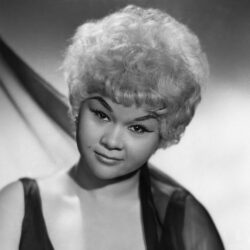Today in Black History: January 25th
1938 – Etta James Born

Etta James, born Jamesetta Hawkins on January 25, 1938, in Los Angeles, became an iconic R&B, jazz, and blues singer in the 1960s. Beginning her training at the tender age of five as the St. Paul Baptist Church choir’s vocalist, trained under the musical director James Earle Hines.
Discovered by Johnny Otis at 16, she gained fame with the Creolettes, recording hits like “The Wallflower.” Her solo career thrived after signing with Chess Records in 1960, with classics like “At Last!”
Etta’s life shows as a testament to overcoming struggles, with recording one of her top songs “Tell Mama” in 1967 while battling a heroin addiction amid this feat which lasted over 20 years, and subsequently battling obesity all while maintaining her singing career.
Overcoming addiction in 1988, James continued to evolve, experimenting with jazz-hip hop in 1989. In 2001, she entered the Blues Hall of Fame and received a Grammy Lifetime Award in 2003. Her influence persisted into the 21st century, culminating in her Grammy-winning album “Let’s Roll” in 2005. The 2008 film “Cadillac Records” depicted her rise, with Beyoncé Knowles portraying her.
Miss Etta James passed away on January 20, 2012, in Riverside, California, leaving behind a lasting legacy in the world of R&B.
1980– Black Entertainment Television (BET) First Aired

Black Entertainment Television (BET), a Viacom cable network, first aired in American homes on January 25, 1980, as a groundbreaking cable network dedicated to young Black American audiences, reaching over 90 million homes globally today. Founded by Robert L. Johnson, a former cable industry lobbyist, BET aimed to fill the void in television programming for the African-American community.
Initially starting with modest two-hour weekly programming, BET quickly expanded its reach throughout North America and the Caribbean by the end of 1980. Despite early financial challenges, the channel turned profitable in the mid-1980s. BET diversified its content by 1985, introducing news, comedy showcases, talk shows, and sports features.
While initially focusing its content on news programs dedicated to the Black community, a 2002 restructuring shifted focus to entertainment, primarily rap videos, leading to the cancellation of news programs. In 2005, BET was sold to Viacom for $3 billion.


